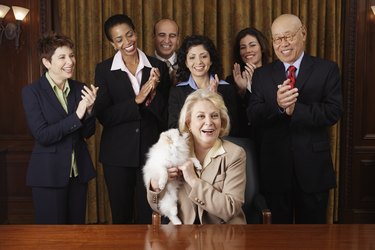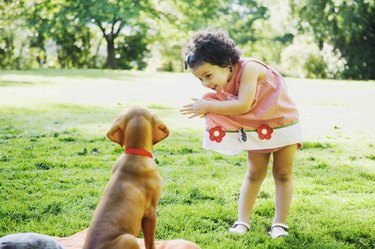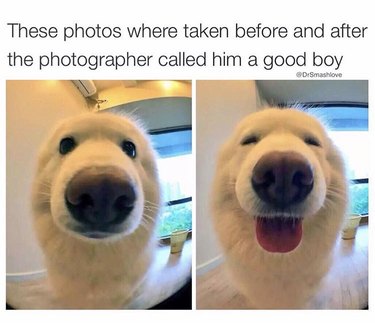Anyone who has ever cooed "good boy" or "good girl" at a well-behaved pupper and been met with an appreciative tail-wag knows that dogs understand verbal praise. They know that those words, spoken in that very special "who's a good boy" voice means, "OMG I did something right and the human is happy and that makes me happy and also treats might be forthcoming and OMG life is SO GOOD RIGHT NOW."
Video of the Day
The inherently adorable doggo response to praise is so ubiquitous, in fact, that it's the subject of several of the internet's best and most aww-inducing memes. Case in point:
The point is, dogs clearly understand praise, at least when it comes in the form of "Who's a good boy? It's you. Yes it is" and/or lots of pets and hugs and kisses. But what about other forms of praise and other ways humans communicate the concept of "Wow! That thing that just happened, that's a thing I LIKE"—like applause, for example? Here's what science, anecdotal evidence, and the abundance of common sense tell us about this puppy-related quandary.
Why do humans clap when we like something?
Before we get to the dog's perspective, let's start with the real basics: Why do humans clap to show that we like something in the first place?
You might think, considering how universal the applause-as-appreciation thing seems to be, that it's one of those innate human expressions, like how some facial expressions always convey the same emotions, across cultures. So, is applause just a universal thing humans do, no matter what? Yes and no.
So, yes, all people clap. Babies start to clap naturally when they're around six months old. While it's adorable and often-YouTubed, however, baby claps aren't babies' way of saying "I approve!" so much as they're babies' way of saying, "WHOA, I JUST LEARNED THAT I HAVE CONTROL OVER THIS WEIRD LIMB THINGS THAT GROW OUT OF MY TORSO!" In other words, babies clap as they start to explore their motor skills, not as they start to have critical opinions of their parents' goo goo gaga faces.
"I think it's a learned behavior," Yvette Blanchard, a pediatric physical therapist and researcher at the University of Hartford, explained in an interview with Esquire. "What I've seen babies do spontaneously, from excitement, is clasp their hands together. But the motion of clapping, I think that's a learned behavior."
When babies start clapping, however, their parents start teaching them—whether explicitly or implicitly—what that sound they're making with their hands means, from a social standpoint. No one has to sit us down and say, "So, when you like something—particularly if you're in a group of people—you can let everyone know that by slapping your hands together, like so." We're able to pick that up from context clues, like how people get excited and keep doing what they were doing when we clapped or how other groups of people all clap when something awesome happens. This might create the appearance that applause is a universal behavior that we don't have to learn, but that doesn't mean that it actually is.
Now, just because applause as appreciation is a thing we learn to do and not something we're born hardwired to do doesn't mean it has a clear origin. As The Atlantic pointed out in an in-depth piece on the history of applause, scholars (because there are scholars for everything, even why we clap) aren't actually sure exactly when we started applauding to show that we liked something—but they do know that it happened a very, very long time ago, and describe it as "a remarkably stable facet of human culture."
While applause might not be a hardwired trait for individual humans, it's possible that it is hardwired in another organism—the crowd. The idea is that, when we come together in a group, we form a new, collective thing and that thing needs a way to communicate, especially if we, the collective group, are trying to communicate with another entity—like, for example, a politician making a speech or an actor performing on stage. Since clapping audible and relatively easy (compared to other sounds we could make to show approval, like snapping or whistling, for example, which not everyone is able to do), it just kind of naturally emerged as the way for big groups of people to convey collective opinions.
Most experts agree that clapping was formalized as a way of expressing approval when the theater really took off, and people wanted a way to let performers and creative types know what they thought of their art (because everyone's a critic, even way, way back in the day).
What's more, we're more likely to clap if other people are clapping—regardless of what our actual personal opinions are. In one study, researchers found that clapping is actually contagious. "Individuals' probability of starting clapping increased in proportion to the number of other audience members already 'infected' by this social contagion, regardless of their spatial proximity," the authors wrote.
tl;dr: In groups, we clap because it's easy to do and everyone else is doing it. As for individual applause-as-appreciation, it's a thing we do because we've learned—whether explicitly or implicitly—that that's just a thing you do when you like something.
What human cues are dogs able to read?
Dogs are very emotionally intelligent creatures. As pack animals, they're extremely social by nature and they've put that innate skill to use as our BFFs, watching us closely and picking up on how we're feeling based on things we do and tones we use. They even sometimes use that knowledge to manipulate us—that's how much they "get" human cues. Even when we express something in a very non-dog way, they can learn what we're trying to get across.
We know, for example, that dogs definitely understand human emotions. In a 2016 study from Dr. Kun Guo and other researchers from the University of Lincoln's School of Psychology, dogs' ability to read human emotion was tested by exposing dogs to emotional sounds and faces from humans. The study was conducted in a language the dogs had not been exposed to, just to make sure they were reacting to the emotional sound of the words and not the words themselves.
"We used Portuguese to British dogs so they weren't habituated with any words, they weren't familiar with any words. So, we wanted to see if the dogs could assess the emotional content of the human voices and whether they would actually discriminate the emotional information within them," Natalia De Souza Albuquerque, a PhD student in experimental psychology told Reuters.
Scientists have even studied dogs' ability to read humans compared to that of our very close cousins, chimps, and found that dogs are better at reading us and our cues than even other primates are.
Do dogs understand applause?

So, do dogs understand what we're trying to express when we clap? The answer is a solid maybe—but, like baby humans, they have to learn what we mean when we're clapping.
If you clap for your dog when he does something great and if he's started to seem happy or proud when he hears someone clapping, then you're not alone. While there isn't research into dogs' response to clapping and applause as praise, the anecdotal evidence around the inter-webs suggests that dogs whose owners clap for them when they're good boys and good girls learn to associate applause with positive (or paws-itive, if you're feeling punny) things.
Are dogs scared of applause?
Not all dogs react with happiness to the sounds of clapping, of course. Some dogs have or develop noise anxieties and it stands to reason that applause (especially the thunderous variety that comes from large crowds) could trigger that anxiety.

While dogs can learn to associate sustained applause with good vibes, most will naturally have a startled reaction to clapping sounds. This isn't really specific to clapping—dogs are naturally curious about the origin of any sudden, loud sound. That's why many experts suggest using a single, firm clap to interrupt dogs and puppies who are engaging in bad behaviors. It's a good way to break their concentration on the act you don't like and to try to reorient their attention toward something positive that you can reinforce with praise, treats and, maybe some happy applause.




